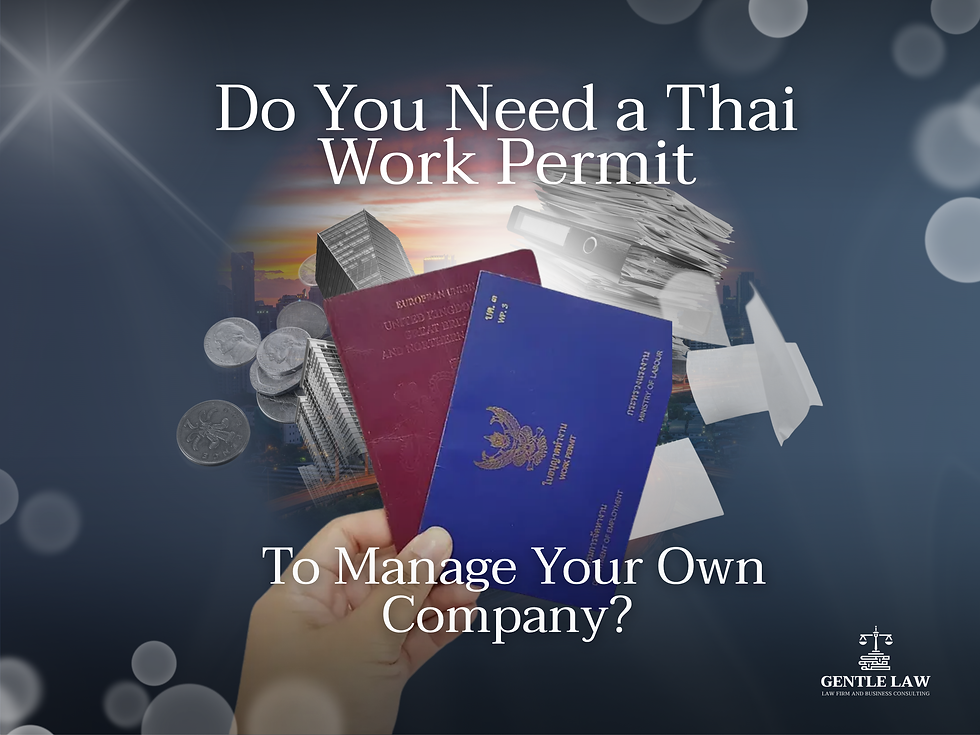Thailand’s BOI Company vs. Regular Thai Company: What Foreign Investors Must Understand Before Registering
- gentlelawlawfirm
- Jul 17, 2025
- 4 min read

Setting up a company in Thailand? One of the most crucial legal decisions for foreign investors is choosing between a BOI-promoted company vs regular Thai company .
Both business structures offer distinct advantages and limitations, especially concerning foreign ownership rights, visa flexibility, and tax incentives.
At GENTLE LAW IBL, we break down the key legal and practical differences between BOI and non-BOI companies, helping foreign entrepreneurs make informed decisions that align with Thai law and their business goals.
What Is a Regular Thai Company?
A regular Thai company is incorporated under the Thai Civil and Commercial Code and regulated by the Foreign Business Act B.E. 2542.
Key features include:
Foreign ownership is generally limited to 49% in most restricted sectors as defined by the Foreign Business Act (Section 27).
Requires a minimum of 3 shareholders, with the majority (at least 51%) being Thai nationals.
Must comply with standard work permit regulations, including maintaining at least 4 Thai employees per 1 foreigner.
Offers faster company registration, typically within 7-14 business days.
Suitable for businesses that do not require full foreign ownership or extensive foreign staffing.
While this structure is flexible and widely used, it may not meet the needs of foreign investors seeking full ownership or specialized visa privileges.
What Is a BOI-Promoted Company?
A BOI-promoted company is one that has been approved by the Thailand Board of Investment (BOI) under the Investment Promotion Act B.E. 2520.
This status grants several significant legal and financial benefits:
Allows up to 100% foreign ownership, even in sectors restricted by the Foreign Business Act.
Exempted from the requirement to obtain a Foreign Business License.
Permits foreign investors to own land in certain promoted sectors (per BOI conditions).
Facilitates expedited visa and work permit approvals, bypassing the standard Thai employee ratio.
Provides potential corporate income tax holidays ranging from 3 to 8 years, depending on the activity.
Requires submission of a comprehensive BOI application with legal justification and compliance monitoring.
BOI promotion suits foreign investors aiming for full control, tax efficiency, and operational scalability within legally promoted industries such as technology, logistics, and advanced manufacturing.
BOI vs. Regular Thai Company: Quick Comparison Table
Feature | Regular Thai Company | BOI-Promoted Company |
Foreign Ownership | Up to 49% (unless exempted) | Up to 100% allowed |
BOI Approval Required | No | Yes |
Restricted Sectors | Restricted, requires Foreign Business License | Generally allowed in promoted sectors |
Land Ownership | Not allowed | Allowed in certain promoted sectors |
Visa & Work Permit | Must maintain 4:1 Thai employee ratio | No Thai employee quota; faster approval |
Tax Exemptions | None | Possible 3-8 years tax holiday |
Use of Nominees | Illegal under Section 36 of Foreign Business Act | Not needed and prohibited |
Processing Time | 7-14 business days | 1-3 months for approval |
Legal Risk | High if using nominees | Low if fully BOI compliant |
Which Company Structure is Right for You?
Choose BOI if you:
Want 100% foreign ownership with full control.
Plan to hire multiple foreign experts without Thai staffing ratio limits.
Operate in strategic promoted industries such as tech, logistics, or digital services.
Seek tax incentives and streamlined immigration benefits.
Aim for long-term, scalable business operations in Thailand.
Choose a Regular Thai Company if you:
Have genuine Thai business partners willing to hold majority shares.
Your business activities are not restricted under the Foreign Business Act.
Require a faster and lower-cost setup process.
Are testing the market or starting with a smaller scale operation.
Common Pitfall: Illegal Nominee Shareholding
Some foreign investors register a Thai company with Thai nationals holding majority shares but retain control via secret nominee agreements.
This practice is illegal under Section 36 of the Foreign Business Act B.E. 2542, exposing investors to serious penalties, including:
Criminal prosecution
Company closure
Blacklisting from business activities in Thailand
Instead of risky nominee structures, the legal alternatives are:
Apply for BOI promotion, if eligible.
Structure control with enforceable shareholder agreements compliant with Thai law.
How GENTLE LAW IBL Supports You
At GENTLE LAW IBL, we provide comprehensive, one-stop legal services for foreign investors, including:
Assessing your eligibility for BOI promotion.
Preparing and submitting BOI applications with robust legal justification.
Ensuring post-approval compliance with BOI and Thai laws.
Advising on company structure, ownership, and governance to minimize risk.
Assisting with visa and work permit applications tailored to your structure.
Drafting shareholder and joint venture agreements under Thai law.
We help you avoid legal pitfalls and optimize your investment structure for Thailand’s unique regulatory environment.
Final Thoughts
BOI company vs regular Thai company? Registering a company in Thailand is straightforward. But choosing the right company structure — legally sound, strategically advantageous, and compliant with Thai law — requires expert guidance.
Don’t risk illegal nominee arrangements or limited ownership. Partner with GENTLE LAW IBL to ensure your company setup aligns with your business vision and Thai regulations.
📩 Ready to register your company the right way?
Schedule your personalized consultation at gentlelawibl.com



